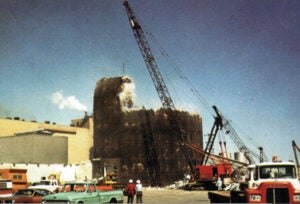A program designed to save power during periods of high electricity demand actually cut off some of Texas’ natural gas supply to customers during the severe winter storm that caused massive blackouts across the state in February.
The Electric Reliability Council of Texas (ERCOT), which operates the power grid for much of the state, has acknowledged it activated a program that pays large industrial power users to reduce their electricity consumption during emergencies. It’s a program similar to those used in other areas, in which factories and commercial buildings are incentivized by utilities and grid operators to cut their use of power, a situation that usually occurs during the heat of summer or cold of winter.
ERCOT, though, said it did not know what groups were part of the program, or what types of facilities were being shut off. Kenan Ögelman, ERCOT’s vice president of commercial operations, told The Wall Street Journal: “We do not know what type of facility it is. We do know [a facility] has qualified and performed to the requirement because we test them, but we don’t know what it is they do.”
Industrial Customers
According to ERCOT, there 447 industrial customers who voluntarily installed the automatic circuit devices to shut down power to their operations as of year-end 2019. A Journal analysis of ERCOT grid records found that some of the facilities to which the gas supply was cut were natural gas infrastructure companies. That meant an even further reduction in the natural gas supply, causing a shortage during a period of extreme cold when a greater supply of gas was needed.
Several lawsuits have been filed against ERCOT in the wake of the February storm, which left more than 4 million people without power, in some cases for days. State records show that at least 111 people died, mostly due to hypothermia; other reports have put the number of deaths tied to the storm at almost 200.
At least three energy companies declared bankruptcy after the storm, and several others are suing ERCOT regarding unexpected price spikes for electricity during the crisis. The situation resulted in the resignations of several state and ERCOT officials, including the firing of ERCOT CEO Bill Magness, and brought calls to restructure the state’s deregulated electricity market.
Brandon Young, CEO of Payless Power, one of several companies that sells electricity to customers in Texas’ deregulated market, on May 10 told POWER, “ERCOT’s decision to pay natural gas companies to stay offline while PUCT [Public Utility Commission of Texas] instructed ERCOT to raise the price of power to an unheard-of $9,000/MWh to incentivize generators to come online,” was not a smart move, noting “None did” come online. “The market was manipulated, resulting in the loss of hundreds of lives and creating billions in artificial debt,” Young said.
“Now energy companies are on the brink of bankruptcy and the Texas Legislature has failed to act,” Young said. “What happened wasn’t a failure of industry, but rather interference by regulators that caused significant harm. ERCOT has the ability to review the ZIP codes of the facilities it shuts off. This is how it avoids turning off power to hospitals and other essential facilities. New ERCOT and PUC commissioners need to review emergency protocols and work closely with current industry players to ensure this does not happen again. Further, the Texas Legislature must take steps to correct the pricing error which occurred to hold all industry officials accountable and ensure there are consequences in place moving forward.”
As a result of the extreme price hikes that occurred during the winter storm, the Public Utility Commission of Texas has changed the systemwide offer cap from $9,000/MWh to the higher of $2,000/MWh or 50 times the fuel index price, which is a natural gas spot price at the Katy Hub.
New Gas-Fired Plants
At least two energy companies have proposed building new gas-fired power plants in Texas to increase the state’s supply of electricity. The plans from Berkshire Hathaway Energy and Starwood Energy Group are both $8-billion proposals to build 10 and 11 gas-fired plants, respectively. In addition, ERCOT’s recent Generation Interconnection Status (GIS) report shows that the grid operator on March 30 approved Pro Energy Services’ 306-MW gas-fired plant to start offering power into the market in the Houston area.
The GIS report said ERCOT has 151.3 GW of projects in various stages of development, including 88.9 GW of solar, 30.3 GW of battery storage, 23.9 GW of wind, and 7.9 GW of gas-fired generation.
Texas, which has a deregulated power market, continues to deal with instability of its power supply in the summer months. The February event also highlighted how extreme cold in the state, though rare, can cause grid disruptions.
Several major electricity users, including manufacturing plants, data centers, and oil and gas facilities, are part of the ERCOT program, according to the grid operator. The facilities are required to install an automatic circuit switch, or manually shut down operations, when demand for electricity threatens to exceed supply on the grid. The contracts give ERCOT the authority to interrupt power to large industrial customers when there are less than 1,750 MW of spare power on the grid.
The Journal on May 7 reported that its analysis of ERCOT data and substation maps “found several dozen instances where the program resulted in power being cut off to infrastructure in the heart of the Permian Basin, the country’s largest oil and gas field. For instance, ERCOT shut off power to five facilities in Loving County, a rural part of West Texas where there are only 169 permanent residents. One facility shed 5.1 megawatts, enough to power more than 5,000 homes.”
ERCOT has said it is not clear how much of an impact the demand response program’s shutoffs of gas to natural gas facilities had on the overall supply of gas, and the supply to gas-fired power plants. The supply of gas during the weather event also was reduced because natural gas wells, pipelines, and compressor stations experienced freezes, and also lost power during the grid operator’s mandated rolling blackouts.
The Houston Chronicle reported that the Texas Oil and Gas Association, the state’s largest oil and gas trade group, said it did not know whether member companies had voluntary contracts with ERCOT to cut power or curtail operations during grid emergencies.
—Darrell Proctor is associate editor for POWER (@POWERmagazine).










